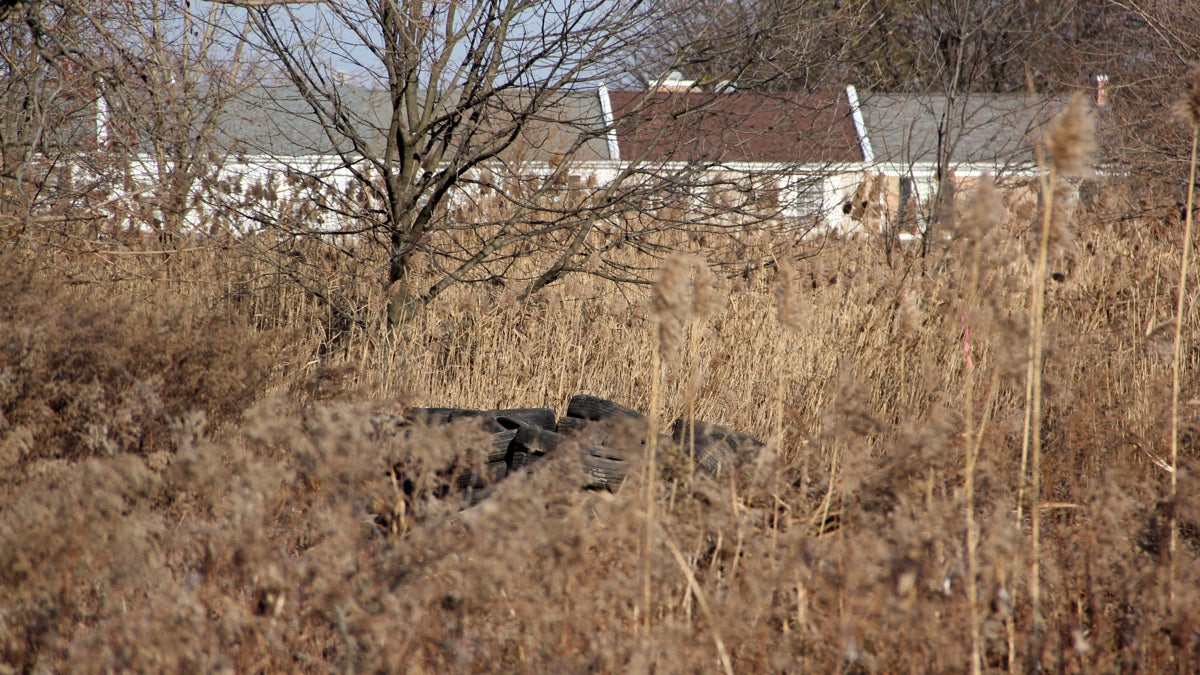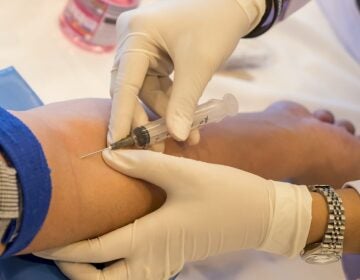We must mobilize now to protect rare and precious water supplies

Houses on 86th Street in Eastwick overlook wetlands littered with a pile of old tires. (Emma Lee/for NewsWorks)
President Trump is committed to eliminating the Waters of the U.S. Rule, which outlines federally protected waterways. Critics of the rule say it hampers development and hurts farmers. Environmentalists say the rule is necessary to protect ecosystems and drinking water. How can the Trump Administration change water rules already in place, and what will happen to Obama Administration proposals? WHYY is hosting a public discussion, “Trump and Our Water Systems: A StateImpact Discussion,” on March 6, about these and other questions. Earl H. Wilson is a guest on the panel.
—
Water, water every where and all the boards do shrinkWater, water every where, nor any drop to drink.—Samuel Taylor Coleridge, 1797-98
These lines were taken from the “Rime of the Ancient Mariner,” by English Romantic poet Samuel Taylor Coleridge. Even though these lines above, on face value, present an extremely dire situation when related to mankind’s future, we, environmentalists, agencies, and citizens who are concerned about preserving earth’s natural water supplies for the 6-plus billion inhabitants of this earth, must use all of our knowledge and energy to put forth the tremendous effort required to preserve our clean water supply.
Approximately 75 percent of the earth is covered with water — most of which is salt water. Approximately 3 percent of the waters of earth — usable, fresh water — can be found at the polar ice caps and some lakes, rivers, and streams and the underground water table.
Please keep in mind the following:
1. Salt water is the dominant source of water on the earth but it is not readily usable for mankind’s basic needs.
2. Fresh water is more readily usable but only makes up 3% of all the earth’s water supply. This percentage of fresh water is shared by all of Earth’s inhabitants (6+ billion people).
We must work very hard to protect especially our usable fresh water supply, or we’ll have to eventually face the situation mentioned in the poem: “Water, water every where, Nor any drop to drink.”
We, the citizens of various communities of the world, cannot rely solely on government officials and their agencies to protect our meager fresh water supply. We, all of us, must become more aware of the problems that can negatively affect our water supply. We must focus on the different types and sources of pollution affecting our water sources and, if necessary, mobilize to keep our water resources clean.
The Environmental Protection Agency has, with some prodding from community and environmental activists, put in place several regulatory rules that should help to protect our water supply in our lakes, rivers, and streams. These rules should slow down the pollution rate and, by doing so, increase the amount of available water for mankind’s use.
There is a new administration in the White House. Based on the information coming from the new administration, there will be a change in the top position for the EPA. This new director, Scott Pruitt, has indicated that he is going to eliminate many of the regulations that were put in place to help make our water resources safe for all of us to drink. Remember, one-third of the United States population get its water from lakes, rivers, and streams that are vulnerable to different types of pollutions.
This anti-environmental policy is aligned with the new president’s views on regulations and the possibility of eliminating the EPA to save money. I do not agree with that move.
We, as community and environmental activists, cannot and should not let this happen. We have to mobilize now, before specific actions are put in place to negatively affect our fresh water supply. We should let our local and governmental officials know that an immediate political price will be paid if the regulatory safeguards that are in place today are removed to expose our water supply to pollution activities from years ago.
—
Earl H. Wilson is a resident of Eastwick, a neighborhood in Southwest Philadelphia. He is actively involved in community and environmental work with Eastwick Action Committee, Eastwick Friends and Neighbors Coalition, and the Darby Creek Valley Association.
WHYY is your source for fact-based, in-depth journalism and information. As a nonprofit organization, we rely on financial support from readers like you. Please give today.




